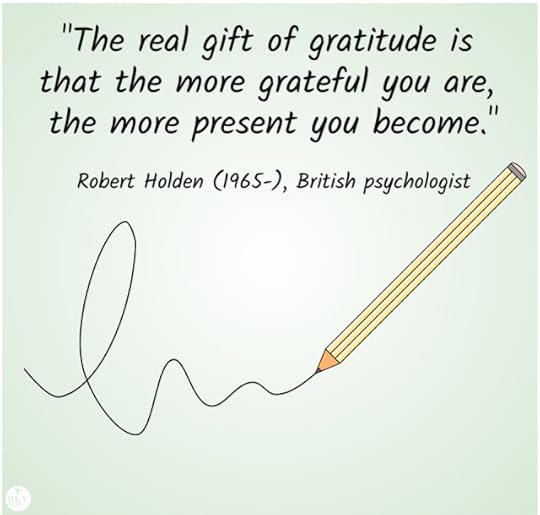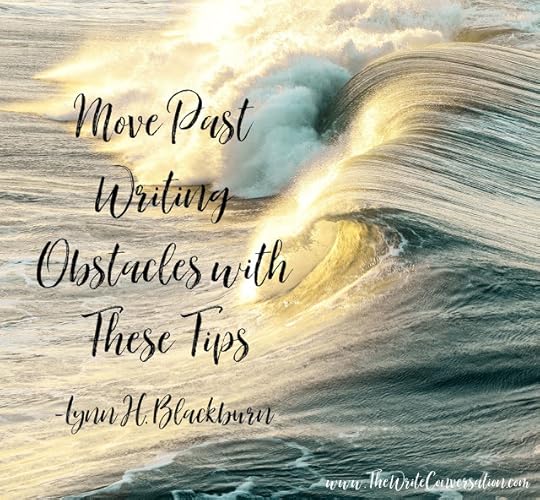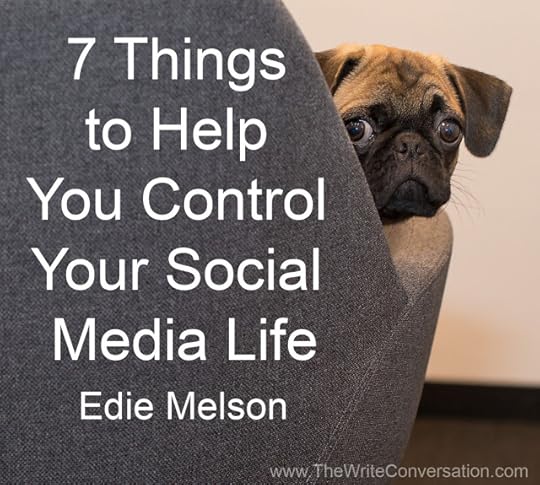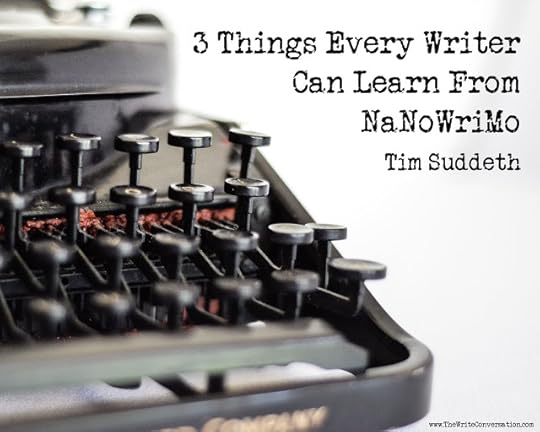Edie Melson's Blog, page 220
November 10, 2019
How to Craft the First Point of Your Presentation: Part 1

by Yvonne Ortega @YvonneOrtega1
What are you passionate about? What could you speak or write on that you would forget to eat a meal or stay up late to prepare for it? That’s your topic. Narrow it as much as you can. Then narrow it again. Let’s say that your topic is exercise. That’s a broad topic. Brainstorm ideas for narrower ones. For example, you might come up with ideas like these:The Best Time of Day to ExerciseHow to Choose the Right Kind of Exercise for Your Body BuildThe Correct Exercise Equipment to Use A Comparison and Contrast of Swimming and KarateWhat to Look for in a GymHow to Select a Personal Trainer
The key is to have your presentation fall into a niche. Maybe right now, you’re wondering what a niche is. It is anything that pertains to a specific section of the population with a specific interest.
The narrower you make that niche, the clearer your presentation will be and the more responsive your listeners will be.
When you narrow your niche as much as possible, you can become an expert within your respective field. As an authority or an expert, you will become the proverbial big fish in the small pond. This is why you read and work to be knowledgeable in your chosen niche.
No matter how often Mama or Granddaddy say your presentation is for everybody regardless of age or gender, don’t believe them. When you narrow the niche, you find your tribe, your real followers, your specific audience. They will show up without manipulation on your part.
Your followers may not be your family members, friends, or coworkers. They may attend an event because they love you and are proud of you. You may bribe them into helping you set up or take down your props, technical equipment, and other items. You may persuade them to run the book table for you or take pictures. And yet, if your topic doesn’t meet their felt need, they will not respond to your message.
So how do you get an audience to respond?
Start with The Foundational Phrase or Sticky Idea.The easiest way to know what you want in that first point is to start with a “foundational phrase” that goes with your presentation. We call it that because your presentation is built on the foundation of that phrase or idea.
Some people call the foundational phrase a “sticky phrase” or a “sticky statement.” In their book, Made to Stick, Chip Heath and Dan Heath call it a “made to stick” phrase.
To craft your foundational phrase or sticky statement, think about what you want your audience to remember at the end of your presentation. What one clear idea do you want them to take home with them?
When I speak or write on domestic violence, my foundational phrase is “The only person you can change is yourself.”
When my topic is grief, the sticky idea is “Grief is a process, not an event.”
Now, let’s look at the characteristics of a sticky statement.
First, the Foundational Phrase Needs to Be Simple.To test the simplicity of your foundational phrase, ask a typical three or four-year-old to repeat it. If the child can, it is simple enough. If the child can’t, work on it to make it simpler.
Second, the Foundational Phrase Needs to Be Profound.When you think about the book of Proverbs, those profound statements stick with you.
For example, a simple and profound proverb is Proverbs 17:22, “A cheerful heart is good medicine” (New International Version).
Third, the Foundational Phrase Needs to Be 10 Words or Less.Besides being simple and profound, your sticky statement should be 10 words or less. Let’s go over the three examples I gave and count the words.“The only person you can change is yourself.” — 8 words“Grief is a process, not an event.” — 7 words“A cheerful heart is good medicine.” — 6 words
To wrap up: A niche is anything that pertains to a specific segment of the population with a specific interest.Narrow your niche as much as possible.To get an audience to respond to your message, start with a foundational phrase. That phrase is the foundation of your presentation.It needs to be simple.It needs to be profound. It also needs to be 10 words or less.
I challenge you to select your topic, narrow it, and write your sticky statement.
In Part 2, you will receive the steps to use that foundational phrase in the first point of your presentation.
TWEETABLEHow to Craft the First Point of Your Presentation: Part 1 - @YvonneOrtega1 on @EdieMelson (Click to Tweet)
 Yvonne Ortega walks with a small footprint but leaves a giant imprint in people’s lives. This power-packed package is a professional speaker and the author of the Moving from Broken to Beautiful® Series through cancer, divorce, forgiveness, and loss. Learn more at www.YvonneOrtega.com
Yvonne Ortega walks with a small footprint but leaves a giant imprint in people’s lives. This power-packed package is a professional speaker and the author of the Moving from Broken to Beautiful® Series through cancer, divorce, forgiveness, and loss. Learn more at www.YvonneOrtega.comYvonne speaks with honesty and humor as she shares her life and struggles through presentations that empower women to find peace, power, and purpose through God’s Word.
Yvonne’s background as a licensed professional counselor brings a unique perspective into the heart of women. She’s a speaking and writing coach and the owner of Moving from Broken to Beautiful®, LLC. She belongs to the Advanced Writers and Speakers Association, the Christian Authors Network, the National Speakers Association, and Toastmasters International.
She celebrates life at the beach, where she walks, builds sand castles, blows bubbles, and dances.
Published on November 10, 2019 22:00
November 9, 2019
Clarity in the Fog

by Edie Melson @EdieMelson
“But ask the beasts, and they will teach you; the birds of the heavens, and they will tell you; or the bushes of the earth, and they will teach you; and the fish of the sea will declare to you. Who among all these does not know that the hand of the Lord has done this?Job 12:7-9 ESV
Most of you know that beyond writing, photography is my second love. It's been amazing to spend time really looking at the world around me and I've been blessed by the spiritual lessons God has taught me through this endeavor. I've begun sharing my photographs and these insights on social media, but I wanted to also post one of them here.
Foggy Clarity
One of my favorite conditions for sunrise photography is cloudy and foggy. I know that seems odd—one would think the ideal condition would be sunny. But so often the beauty of a setting is enhanced by less than perfect circumstances.
I’ve found that true in life as well. Perfect settings and ideal circumstances make me lazy. But stormy times can bring out beauty I don’t even suspect is there. Stress makes me rely more fully on God. Challenges force me to grow and become more Christ-like. And all of the struggles make me appreciate all the beautiful people and circumstances surrounding me.
So next time the clouds roll in, look for the opportunity to experience the beauty of life in an unexpected way.
TWEETABLE
Clarity in the Fog - @EdieMelson (Click to Tweet)
 Edie Melson is a woman of faith with in-stained fingers exploring life through the lens of her camera. She’s been known to quip that she’s creative out of self-defense. Not a surprise since she’s the daughter of an artist-mother and musician-turned-photographer-father, and admits she’d have been a disgrace if she hadn’t been true to her own creativity. Her award-winning images—just like the books she authors—challenge her audience to examine life from a different angle. As a popular speaker, she’s encouraged and equipped audiences across the country and around the world,. She lives in the upstate of South Carolina and can either found with her typewriter or wandering the mountains with her husband, a dog, and favorite camera.
Edie Melson is a woman of faith with in-stained fingers exploring life through the lens of her camera. She’s been known to quip that she’s creative out of self-defense. Not a surprise since she’s the daughter of an artist-mother and musician-turned-photographer-father, and admits she’d have been a disgrace if she hadn’t been true to her own creativity. Her award-winning images—just like the books she authors—challenge her audience to examine life from a different angle. As a popular speaker, she’s encouraged and equipped audiences across the country and around the world,. She lives in the upstate of South Carolina and can either found with her typewriter or wandering the mountains with her husband, a dog, and favorite camera.
Published on November 09, 2019 22:00
November 8, 2019
GRATITUDE: Choosing not to Overlook the Little Things

by Beth K Vogt @BethVogt
Being thankful seems to come more easily to us in November, doesn’t it?
From the first day of the month, we’re thinking about Thanksgiving. Yes, maybe for some of us our focus has been pared down to nothing more than a national holiday that gives us a chance to feast on turkey and all the traditional trimmings. But we also can’t help but catch at least a glimpse of the “give thanks” part of the holiday.Which brings me to this blog post.
As writers, we like to celebrate – be thankful for – the big things that happen in our writing journey. Landing an agent. Signing a contract. Winning an award.
Today, let’s stop and consider the little things we can be thankful for. Things like:The beginning of a book idea. Every book idea starts off small. “Maybe … maybe this is the catalyst to something bigger,” we think. “Something readers will fall in love with. Or something they will relate to. Or something they will want to read as an escape into another world or an unlikely adventure or a mystery.” Paper, pens, and ink. Most writers have a thing for the elements of our craft, things like paper, pens, and ink. Take us to a store and we can’t pass by the aisle loaded down with pens and notebooks. Take us to an entire stationery store – Papyrus, anyone? Paper Source? – and the endorphins start flowing so that we’re happy for the rest of the day. Brainstorming sessions. Some of us might argue that time to be creative with other writers is a big thing. But sometimes we can only snatch moments to mull over ideas or snarls in our scenes with other writers. Any time – be it a few moments or a few hours – are worthy of our gratitude.Quiet moments. Moments of quiet in our busy, busy lives are hard to find, aren’t they? After I typed that question, I turned off my TV and found some moments of quiet with that simple choice. I believe quiet and creativity are linked. It’s good to honor our creativity by protecting our solitude. (And that’s another blog post.) Let’s not overlook the opportunities we have for quietness, and let’s recognize our innate need for purposeful seclusion to refuel our creative hearts.
What are some small things you are thankful for as a writer?
TWEETABLE
GRATITUDE: Choosing not to Overlook the Little Things - @BethVogt on @EdieMelson (Click to Tweet)
 Award-winning author Beth K. Vogt believes God’s best often waits behind the doors marked “Never.” Having authored nine contemporary romance novels and novellas, Beth's first women's fiction novel with Tyndale House Publishers, Things I Never Told You, released May 2018. Moments We Forget, book two in the Thatcher Sisters Series, releases May 2019. An established magazine writer and former editor of the leadership magazine for MOPS International, Beth blogs for Novel Rocket and The Write Conversation and also enjoys speaking to writers group and mentoring other writers. Visit Beth at bethvogt.com.
Award-winning author Beth K. Vogt believes God’s best often waits behind the doors marked “Never.” Having authored nine contemporary romance novels and novellas, Beth's first women's fiction novel with Tyndale House Publishers, Things I Never Told You, released May 2018. Moments We Forget, book two in the Thatcher Sisters Series, releases May 2019. An established magazine writer and former editor of the leadership magazine for MOPS International, Beth blogs for Novel Rocket and The Write Conversation and also enjoys speaking to writers group and mentoring other writers. Visit Beth at bethvogt.com.
Published on November 08, 2019 22:00
November 7, 2019
5 Daily Questions Writers Should Ask God

by Joshua J Masters @JoshuaJMasters
Learning the disciplines of writing is important, but it’s even more essential for Christian authors to develop an ongoing focus on God as they use their gift.
Here are five questions every Christian writer should ask God to start their day.1. Aside from writing, how do You want to spend time with me today?
God designed every talent He’s given us to glorify His name and draw us closer to Him. It’s important that we have a regular writing time, but don’t mistake writing with God for relationship building. Ask Him how He wants to spend time with you today.
We sometimes get into a routine.Make coffee. Check.Read the Bible. Check.Read today’s devotional. Check.Run through my prayer list. Check.
But a healthy, growing relationship with God will never emerge from checklists. It evolves in deep, meaningful encounters. Ask God what He wants you to experience with Him beyond your writing today.
Abide in me, and I in you. As the branch cannot bear fruit by itself, unless it abides in the vine, neither can you, unless you abide in me. I am the vine; you are the branches. Whoever abides in me and I in him, he it is that bears much fruit, for apart from me you can do nothing (John 15:4-5 ESV).
2. Is there anything in me You want to address before we write?
Before we ever open our laptop, we should ask God to help us examine anything in our actions or heart that would prevent us from hearing His voice as we write.
Did anything happen yesterday I need to make amends for?Is there anyone I’m withholding forgiveness from?Is there a sin issue God wants me to surrender to Him or confess to another believer?Is my heart prepared to write His words instead of my own?
Even the most well-structured plot outline or chapter summary is easily thwarted by a chaos-filled soul.
Let’s make this passage our prayer before writing a single word today:
Search me, O God, and know my heart; test me and know my anxious thoughts. Point out anything in me that offends you, and lead me along the path of everlasting life (Psalm 139:23-24 NLT).
3. What do You want me to learn from our writing time together?
Many of us became writers because we believe God’s put a burden on our heart to share something with the world. Whether we’re writing nonfiction or Christian romance, it’s incredible to think He’s chosen us to reflect His glory to a broken world with the written word.
But you can’t give what you’re not receiving.
It’s not uncommon for me to pray things like, “Father, help me write the words You want written,” or “What’s the message you want revealed in this story?” Those are good days. Sometimes it’s, “Dear Lord! Help me finish this stupid chapter.”
But the message God has us writing to the world should be secondary to the lesson He’s trying to write on our hearts.
A missed word count will never threaten God’s plan. He doesn’t need us to accomplish His will, but invites us to be part of the work He’s doing to develop a relationship with us and help us become more like Christ.
I think we’ll struggle less in our writing if we focus on what He’s trying to teach us over what we’re trying to teach the world.
Guide me in your truth and teach me, for you are God my Savior, and my hope is in you all day long (Psalm 25:5 NIV).
4. What do You want to say through our writing today?
After all these deep questions, it’s almost time to put fingers to keyboard. Having invested in our relationship with God, tested our spiritual condition, and sought what God is asking us to learn, we’re in a better position to partner with Him in our writing.
“What do You want to say,” is always a more powerful question than, “How do I get this done?”
Sometimes I struggle in my writing because I’m disconnected from what God wants to communicate through it. Worse still, sometimes I don’t care. Good Christians probably aren’t supposed to say that out loud, but I’ve been known to think I have a great idea that doesn’t require God’s input. I’m always wrong.
Let’s be intentional in seeking what God is trying to say through our writing every day, taking seriously His grace in speaking to and through us.
So we are Christ’s ambassadors; God is making his appeal through us. We speak for Christ when we plead, “Come back to God!” (2 Corinthians 5:20 NLT)
5. Who do you want me to encourage today?
Finally, as we serve God in our writing, we should remember that we’re also called to serve others. The natural tendency of many writers is to isolate. That’s not true of every person called to write, but any of us can get wrapped up in our own goals.
God designed us to live in community with one another, strengthening one another. And one of the surest ways to overcome our own stumbling block is to encourage someone else in theirs.
The Christian writing community is filled with incredible people who love giving a kind word or loving advice to other authors in the faith. Seek them out and become one of those people.
Be specific in asking God who He wants you to pray for, and who He wants you to reach out to today. Ask Him to put people in your path that need encouragement. Then be His ambassador off the page.
Therefore encourage one another and build one another up, just as you are doing (1 Thessalonians 5:11 ESV).
TWEETABLE5 Daily Questions Writers Should Ask God - @JoshuaJMasters on @EdieMelson (Click to Tweet)
 Joshua J. Masters is a pastor, author, and speaker. He’s been featured on CBN Television, HIS Radio, and the Light Radio Network. Josh is the author of American Psalms: Prayers for the Christian Patriot and is a contributing author for Feed Your Soul, Refresh Bible Study Magazine, and One Christian Voice. Josh has also worked as an actor and crew member in the film industry (SAG/AFTRA) and continues to have a passion for film. He lives with his wife, Gina, and Franklin the Pup outside Greenville, South Carolina where he serves as a speaking and care pastor.
Joshua J. Masters is a pastor, author, and speaker. He’s been featured on CBN Television, HIS Radio, and the Light Radio Network. Josh is the author of American Psalms: Prayers for the Christian Patriot and is a contributing author for Feed Your Soul, Refresh Bible Study Magazine, and One Christian Voice. Josh has also worked as an actor and crew member in the film industry (SAG/AFTRA) and continues to have a passion for film. He lives with his wife, Gina, and Franklin the Pup outside Greenville, South Carolina where he serves as a speaking and care pastor.Josh would love to connect with you on his website, www.joshuajmasters.com or engage with you on Facebook, Twitter, Instagram, or Goodreads.
Published on November 07, 2019 22:00
November 6, 2019
Move Past Writing Obstacles with These Tips

by Lynn H Blackburn @LynnHBlackburn
My family and I recently spent a lovely week on the Emerald Coast of Florida. The white sandy beaches of the panhandle are beautiful and the water is clear—a big plus for me because I love playing in the water, but I don’t love wondering what’s swimming with me! My favorite way to enjoy the beach is to make my way past the breaking waves and settle into the relaxing swells that can be found just a bit further out from the shore.
Unfortunately, it takes a lot of effort to get past the breakers. On our first day of vacation, the wind was blowing and the waves were crashing into the shoreline. Every step was a struggle and many times I felt like I was walking in place, making no progress toward my goal. More than once, a wave caught me and slammed me to the ground. I wound up with a few bruises and a skinned knee to show for my efforts.
But eventually, I reached the goal. I could bob and bounce in the swells and, while it still involved effort, it wasn’t overwhelming or exhausting. Sometimes a big wave would catch me off guard and crash over me but, for the most part, my head stayed above water and I enjoyed being out there doing something I loved.
You already know where I’m going with this, don’t you?
As writers, we can’t avoid the breakers.
Every time we begin a new series, a new novel, a new project of any kind, the intensity of the resistance is off the charts. We stumble around through the first few chapters. We write ourselves into holes and have to start over. We start plot threads that we completely forget about. We change characters names in mid-scene. Let’s not even get started on how many times we have to go back and look to see what color the hero’s eyes are or how long the heroine’s hair was on page three. And could we have a moment of silence for how often we create eight-day weeks or twenty-seven hour days?
This is the point where a lot of people make one of two critical mistakes:
1. They quit.
They conclude that because it is so hard, they must be doing something wrong. They think they aren’t cut out for writing and they don’t want to go through this just to scribble out a few words.
The reality is that they weren’t do anything wrong at all. They just quit too soon. They gave up and trudged back to the sandy shore before they realized what joy and delight they would find in the deeper swells.
2. They fight the breakers every time they write.
Now hear me out on this: I’m not someone who says you have to write every day to be a real writer. But it has been my painful experience to learn that it’s really in your best interest to tough it out through the beginning breakers and once you get into the swells? Stay there! Don’t take a month or two off thinking that now you’ve got it all figured out and it will be smooth sailing. Um . . .no. If you don’t come back to the story on a regular basis, you’ll discover that you have to fight your way through the breakers every time. It’s exhausting and demoralizing to have to do that much work to get the story moving again.
If you’re in need of a little push to help you power your way through the beginning breakers, November is a great month. NaNoWriMo (National Novel Writing Month) is happening right now and it’s not too late for you to jump in. Writers from all over the world are hanging out in person or online and encouraging each other to write 50K words by November 30th. Even if you don’t “win,” the simple act of participating and pushing yourself to write consistently and in higher volumes than you normally do could be just what you need to get you to a place where you look forward to your writing, rather than dreading it.
I’m doing NaNo this year. You can find me @LynnHB in the NaNoWriMo buddy listings. I’d love to cheer you on!
Grace and peace,

TWEETABLE
Move Past Writing Obstacles with These Tips from @LynnHBlackburn on @EdieMelson (Click to Tweet)
 Lynn H. Blackburn loves writing suspense because her childhood fantasy was to become a spy—but her grown-up reality is that she's a huge chicken and would have been caught on her first mission. She prefers to live vicariously through her characters and loves putting them into all kinds of terrifying situations—while she's sitting at home safe and sound in her pajamas!
Lynn H. Blackburn loves writing suspense because her childhood fantasy was to become a spy—but her grown-up reality is that she's a huge chicken and would have been caught on her first mission. She prefers to live vicariously through her characters and loves putting them into all kinds of terrifying situations—while she's sitting at home safe and sound in her pajamas! Her Dive Team Investigations series kicked off in 2018 with Beneath the Surface and In Too Deep (A SIBA Okra pick and Selah Award Finalist). The 3rd book in the series, One Final Breath, releases in September 2019. She is also the author of Hidden Legacyand Covert Justice,which won the 2016 Carol Award for Short Novel and the 2016 Selah Award for Mystery and Suspense. Lynn lives in South Carolina with her true love and their three children. You can follow her real life happily ever after at www.LynnHBlackburn.com and on Facebook, Twitter, Pinterest, and Instagram.
Published on November 06, 2019 22:00
November 5, 2019
The Business of Writing

by Sarah Sally Hamer @SarahSallyHamer
Lots of writers just write. The joy of creating a story, of dealing with those voices in your head, is amazing. And, if that’s all the farther it goes for a writer, there’s nothing wrong with that. But many writers take it to the next step and attempt to make a career of it. And, that’s when everything changes.
Writing is a business and businesses need to follow rules, even before the writer becomes successful. I know, I know. Rules are scary things, like monsters in the closet. But, honestly, most of the requirements are not that difficult.
The “back sides” of businesses are very similar, whether they’re selling shoes, services, or books.
Businesses need:A vision and understanding of exactly what that business is trying to accomplish. Use your writing skills to write a plan for what you’d like to accomplish this week, this month, this year. Break it down into realistic bites and set up a schedule. You’ll be amazed at how much you can do in a year! Organization. Figure out what you need to follow that schedule. Research? Put it on the calendar. Take a class? We never stop learning! Need to track something? Set up a spreadsheet. Carve out a space for your writing business, even if it’s just a box in a corner. But take your career—and you!—seriously.Accounting of money. The IRS already considers writing a hobby most of the time and, if you don’t keep good records they can and will disallow your deductions. Make sure you keep your receipts, (NOT in a shoebox!) and list them by month and type of expense. Keep track of your income – every dime is considered taxable by the IRS. You can use inexpensive accounting software or just a notebook and pen, but keeping records is how a good business runs. Note: I am NOT an expert on income tax. You will probably need one, however.Separate your writing money from your home money. Keep track of it. Know how much you can spend on your writing business and stick to it.Accounting of marketing and return on investment (ROI). If I know how many books I sold because of a particular promotion, it’s a lot easier for me to determine whether it was worth the money, especially when I’m thinking of doing that promotion again. If I don’t make money, I may make a different choice. Of course, direct ROI (connecting a promotion to income) as opposed to indirect ROI (just putting things out there) can be difficult to figure out. But both are important things to track. One more thing: I’m absolutely against borrowing money to spend on a promotion. Yes, it’s easy to charge on that plastic card but, if you’re not making money on a book, it will have to be paid from somewhere else. Which leads to:Make a budget. Decide how much you can spend. Yes, sometimes businesses go into debt, but it’s never a good idea. Reward yourself when you reach a goal. Not every business does this, of course, but you can certainly pick a prize and use it as a carrot to get you where you want to be. Treat yourself as an employee. Take some time off. Don’t push too hard. Find some fun in what you do.
Are you running your business like a business? Why not!?!?!
TWEETABLEThe Business of Writing - insight from @SarahSallyHamer on @EdieMelson (Click to Tweet)
 Sarah (Sally) Hamer is a lover of books, a teacher of writers, and a believer in a good story. Most of all, she is eternally fascinated by people and how they 'tick'. She’s passionate about helping people tell their own stories, whether through fiction or through memoir. Writing in many genres - mystery, science fiction, fantasy, romance, medieval history, non-fiction – she has won awards at both local and national levels, including two Golden Heart finals.
Sarah (Sally) Hamer is a lover of books, a teacher of writers, and a believer in a good story. Most of all, she is eternally fascinated by people and how they 'tick'. She’s passionate about helping people tell their own stories, whether through fiction or through memoir. Writing in many genres - mystery, science fiction, fantasy, romance, medieval history, non-fiction – she has won awards at both local and national levels, including two Golden Heart finals.A teacher of memoir, beginning and advanced creative fiction writing, and screenwriting at Louisiana State University in Shreveport for over sixteen years, she also teaches online for Margie Lawson at www.margielawson.com. Sally is a free-lance editor and book coach at Touch Not the Cat Books, with many of her students and clients becoming successful, award-winning authors.
You can find her at hamerse@bellsouth.netor www.sallyhamer.blogspot.com
I wish to express gratitude to the giants whose shoulders I stand on and who taught me so much about the writing craft. I would list every one, if it were only possible.
Published on November 05, 2019 22:00
November 4, 2019
The Writing Duet

by PeggySue Wells @PeggySueWells
Author of more than 195 books with sales of over 70 million copies, Jerry B. Jenkins has had 21 titles on the New York Times bestseller list. Owner of the Jerry B. Jenkins Writers Guild, he received this advice in his early years as an up and coming writer.Back in the early 1970s, when I was in my early 20s and had recently married, I answered what I believed was a call to Christian journalism and left sports writing to become Managing Editor of FreeWay, a high school take-home paper published by Scripture Press Publications.
My boss there was Stanley C. Baldwin, a quiet, unassuming, interesting character that was also a local pastor. He not only edited everything I wrote, but he also second-edited everything I edited. A college dropout, I was now, in essence, getting a taste of graduate school. Every single day I resolved to present to Stan a piece of writing or editing he couldn’t improve. And every day the work returned to my inbox bearing his marks showing things I had missed.
His eagle eye made me work harder and harder, and while I never got to the point where he couldn’t change a thing (a good lesson – we always need another pair of eyes on our work), over the course of two years I saw fewer and fewer adjustments coming back. Working under Stan was the best schooling I ever got. I became a ferocious self-editor, and I still work to polish my writing with each pass.
The two best pieces of advice I got from Stan were:
1. An article must not be only about something, but it must also be for the purpose of something.
2. Every piece of published writing is not a solo but rather a duet between the writer and the editor. Develop a thick skin.
My goal to this day is to submit the cleanest manuscripts I can. The most gratifying thing I can hear from a publisher is, “Our editors barely needed to touch it.”
TWEETABLE
The Writing Duet - Thoughts on the power of editing from @PeggySueWells on @EdieMelson (Click to Tweet)
 Tropical island votary and history buff, PeggySue Wells parasails, skydives, snorkels, scuba dives, and has taken (but not passed) pilot training. Writing from the 100-Acre wood in Indiana, Wells is the bestselling author of twenty-eight books including The Slave Across the Street, Slavery in the Land of the Free, Bonding With Your Child Through Boundaries, Homeless for the Holidays, and Chasing Sunrise. Optimistic dream-driver, PeggySue is named for the Buddy Holly song with the great drumbeat. At school author visits, she teaches students the secrets to writing, and speaks at events and conferences. Connect with her at www.PeggySueWells.com, on Facebook at PeggySue Wells, and Twitter @PeggySueWells.
Tropical island votary and history buff, PeggySue Wells parasails, skydives, snorkels, scuba dives, and has taken (but not passed) pilot training. Writing from the 100-Acre wood in Indiana, Wells is the bestselling author of twenty-eight books including The Slave Across the Street, Slavery in the Land of the Free, Bonding With Your Child Through Boundaries, Homeless for the Holidays, and Chasing Sunrise. Optimistic dream-driver, PeggySue is named for the Buddy Holly song with the great drumbeat. At school author visits, she teaches students the secrets to writing, and speaks at events and conferences. Connect with her at www.PeggySueWells.com, on Facebook at PeggySue Wells, and Twitter @PeggySueWells.
Published on November 04, 2019 22:00
November 3, 2019
7 Things to Help You Control Your Social Media Life

by Edie Melson @EdieMelson
I’m just back home from several weeks of teaching at writing conferences. In spite of the fact that I’m a card-carrying introvert, I love getting to share what I’ve learning about publishing and marketing with other writers. One of the things I get asked over and over again is, “How do you accomplish so much and still have time to write.”
This question always thrills me, because I have some tips that can truly make a difference in the person who’s asking. My tips aren’t difficult or expensive or even hard to implement. Many are ones I’ve developed over the years as I’ve tried to give myself more uninterrupted writing time. Others are ones I’ve learned from fellow authors. Today I’m going to share them with you.7 Things to Help Control Your Social Media Life1. Start using a scheduling program. There is no way I could have such a consistent social media presence without the use of Hootsuite. Buffer is also a good option. Either one you choose will be a life-changer. I can schedule all my social media posts (not blog posts, just social media) for the entire day in thirty-minutes. Then I can appear to be online, while I’m actually working on writing.
2. Quit trying to be active on too many networks.Active is the key word here. I have accounts—and up-to-date info—on all the big networks. I’m on Twitter, Facebook, Google+, Instagram, Pinterest, Periscope, LinkedIn, YouTube, Goodreads, and probably a couple of others I’ve forgotten. So anyone searching these networks will see a recognizable picture of me and a link to my website. BUT, I’m only actively posting to Twitter and Facebook. I just can’t keep up with more than that. And truthfully, that’s enough. Choose two or three networks and stick with those.
3. Do your homework and build a library. No, not a room—or building—in which to store your books. I’m referring to last week’s post about How to Always Have Something of Value to Share on Social Media. If you don’t have a ready-made list of places to look for social media updates, it will take you a long time to come up with things to share.
4. Use a timer to keep track of your time. I get it. I can spend hours on Facebook, just browsing. But that’s free-time activity, not publishing-related activity. Don’t waste your valuable writing time by getting lost on a social media network. If you have trouble with this, set a timer.
5. Quit posting different things to different networks. Yes, in an ideal world, where we all had paid assistants, we’d take time to compose social media updates specific to each network we’re on. Unfortunately, the vast majority of us don’t live in that type of world. We have to do the best we can, with the time we have. For me, that means composing one update and sending it out to multiple networks. I don’t think managing my time this way has hurt me. I have almost 18,000 Twitter followers, 1000s of Facebook friends and followers and 1000s of other connections across other networks.
6. Don't spend so much time watching your numbers. You agonize over friends and followers, trying to anticipate the ups and down an stay on an even uphill trajectory. Relax. Your numbers will rise and fall for an infinite number of reasons—most of which you’ll have little or no control over. Do what you need to do (be consistent, use a scheduling program, don’t talk about yourself very often, etc.). Then take a deep breath and limit your number crunching to once a month. If you do the things I’ve mentioned here (and on this blog), your numbers will grow. But more importantly, you’ll make real and valuable connections that will be supporters and readers.
7. Start being consistent on social media. By that I mean you skip a day or two (or a week or two). Then, to make up for it, you spend several hours at a time on social media. This All or Nothing Social Media Mindset (I did an entire blog post here) is as bad as doing nothing. It keeps you from gaining any kind of momentum with the effort you’re making. Spending ten or fifteen minutes a day, five days a week will get you way further down the road than spending two hours, once a week. The reason is because your name is out there more often. With social media, it’s how often your name shows up, not for how long a time it’s there, that makes the difference.
These are the main things I’ve found that suck my writing time into social media time. I’d love to find what time-wasters plague you—and how you combat them. Be sure to leave your thoughts in the comments section below.
Don’t forget to join the conversation!Blessings, Edie
TWEETABLES7 Things to Help You Control Your #SocialMedia Life - @EdieMelson (Click to Tweet)
Published on November 03, 2019 22:00
November 2, 2019
Writing from Affliction: Psalm 102

by Audrey Frank @AudreyCFrank
Hear my prayer, O Lord; let my cry for help come to you. Do not hide your face from me when I am in distress. Turn your ear to me; when I call, answer me quickly (Psalm 102:1-2).
If the afflicted one has the strength to capture his emotions and thoughts in written words, he gives a profound gift to the world.Psalm 102 is a prayer of an afflicted man when he is faint and pours out his lament before the Lord.
The word “pours out” is the Hebrew word šāpak, meaning to spill forth, as in a drink offering, or specifically, blood in the sense of slaughtering. It is used figuratively to signify the “pouring out” of God’s punishment and His fury (Hosea 5:10, Lamentations 2:4). Šāpak is a fitting word to describe the violent emotions that ravage the heart gripped by affliction.
Commentator William MacDonald, in The Believer’s Bible Commentary, suggests that the afflicted man in Psalm 102 is not just any man, He is the Lord Jesus Christ, The Afflicted One who bore our sorrows on the cross. MacDonald describes Psalm 102 as a conversation between the Lord Jesus, hanging on the cross, and the Father and Holy Spirit.
I find his interpretation fascinating and faith-inspiring. To think that the Great Author penned that sacred and painful conversation long before its execution, for us to read today and to know we are not alone in our suffering, makes me love my Lord even more.
His choice to tell me in written words the anguish, the desperation, the loneliness, He felt has brought me comfort on the longest, darkest nights. The raw honesty with which He describes the agony of obedience floods me with grace when I am struggling to yield my will. The clear, resonant call to look upward, to remember the unchangeable things, the eternal things, the foundation of everything, gives me the courage to stand when everything in me screams for collapse.
If God chose to write His emotions and thoughts during His penultimate moment of suffering, can I not choose to do the same?
It is so easy to withdraw into ourselves, hide our pain, keep it private, preserving a tidy and not-too-emotional image to the world. After all, people are watching us. They are reading our words. We have a reputation to uphold. If they see us hurting we may lose credibility. They may gossip about us. They may misunderstand us.
How can I presume to protect myself from such things when my Savior was exposed to them all? Psalm 102 is a vivid recording of the shame and ridicule he chose to bear. For me and for you.
I want to be like Him, to show the real Jesus to a hurting world. So I must write. I cannot selfishly clutch even my sorrows to my bosom, for they too belong to Him. All my words, the comforting and the uncomfortable, are His instruments. If He did not withhold even his deepest pain from me, should I not do the same for those who might need my words today?
I am compelled to write from my affliction as well as my joy. I take up my pen and I šāpak my tumultuous thoughts, the confusion mixed with clarity, the courage mingled with weakness, the confidence jumbled with reluctance. I send my words forth in all their vulnerability to the vulnerable, the lonely, the one needing courage, the one dearly loved but feeling abandoned, the one who thinks she is the only one.
As I write and as she reads, the One who was afflicted for both of us will heal our hearts.
Perhaps if I write from my affliction it will change the world, one heart at a time. One sorrow at a time comforted, one burden at a time made lighter, one head hung low at a time gently lifted up to the Savior. Perhaps.
Lord, untangle my affliction as I take up my pen today. May my words bring hope instead of despair, joy instead of sorrow, and peace instead of anxiety. Amen.
TWEETABLE
Writing From Affliction - Thoughts on Psalm 102 from @AudreyCFrank on @EdieMelson (Click to Tweet)
 Audrey Frank is an author, speaker, and storyteller. The stories she shares are brave and true. They give voice to those whose words are silenced by shame, the hard things in life that don’t make sense, and the losses that leave us wondering if we will survive. Audrey and her family have spent over twenty years living and working among different cultures and world views, and she has found that God’s story of redemption spans every geography and culture. He is the God of
Instead
, giving honor instead of shame, gladness instead of mourning, hope instead of despair. Although she has three different degrees in communication and intercultural studies, Audrey’s greatest credential is that she is known and loved by the One who made her.
Audrey Frank is an author, speaker, and storyteller. The stories she shares are brave and true. They give voice to those whose words are silenced by shame, the hard things in life that don’t make sense, and the losses that leave us wondering if we will survive. Audrey and her family have spent over twenty years living and working among different cultures and world views, and she has found that God’s story of redemption spans every geography and culture. He is the God of
Instead
, giving honor instead of shame, gladness instead of mourning, hope instead of despair. Although she has three different degrees in communication and intercultural studies, Audrey’s greatest credential is that she is known and loved by the One who made her.Audrey is the author of Covered Glory: The Face of Honor and Shame in the Muslim World (Harvest House Publishers), an outpouring of Audrey’s heart to introduce others to the God of Instead. Shame is not unique to the developing world, the plight of the women behind veils, young girls trafficked across borders; shame is lurking in hearts everywhere. Through powerful stories from women around the world, Covered Glory illuminates the power of the Gospel to remove shame, giving honor instead. Available at favorite booksellers: Barnes & Noble , Books A Million, Amazon.
You can also find Audrey at www.audreyfrank.com, as well as on Twitter and Facebook
Published on November 02, 2019 22:00
November 1, 2019
3 Things Every Writer Can Learn From NaNoWriMo

by Tim Suddeth @TimSuddeth
It’s the second day of November. For all our readers who are participating in NaNoWriMo (National Novel Writing Month), I wish you good luck and hope you have many great ideas. Remember you have the whole month. It’s okay if everything doesn’t go exactly as planned. I mean, when has it ever gone as planned?But I imagine many, if not most, do not have writing a novel as a goal. I suspect that most of us stick to writing shorter works; devotions, articles, bible studies, etc. Good for you. Writing a novel is hard, it takes time, and it’s hard to wrap your arms around it when you’re revising.
Since you aren’t trying to write 50,000 words, NaNoWriMo doesn’t hold much interest for you. Why should you struggle to write 1666 words a day for a month?
I agree, NaNoWriMo may not be your cup of tea (or coffee as the case may be). But that doesn’t mean that we can’t learn some lessons from it to use with our works. There are several tips we can take from it.
How To Use The Benefits Of NaNoWriMo No Matter What You Write
1. SocialI got an email from the library last week about the different events it is having for NANOWRIMO, including workshops and write-ins. I see several benefits to getting involved in these.
Now, I’m not talking about a critique group here, although that is fine and I have been helped by being a member of a couple of them. I’m suggesting going somewhere to write. It’s amazing how changing environments can spur your creativity and bring new ideas.
First, sometimes writing in a different place can give you a boost. I’ve heard this advice a lot when I’ve been stuck in my writing. Going to a new place gives you a new energy. And if you usually write at home, it gets you away from those nagging distractions like laundry, the fridge, children, or a pet who either demands getting in your lap or on your laptop.
The second benefit is it gets you out of your hermit cave and out with other writers. There’s something about being with other writers that encourages and inspires us. No matter where on the writing spectrum you are, you both will benefit.
When the days become shorter, it’s easy to cocoon over your laptop and forget about going out. (I like writing in my old pjs.) Over time, this isn’t good for our health, emotional or physical. Make time to get out with writers who can encourage you and share that same passion that drives you.
2. CreativityMany writers participate in NANOWRIMO so they can write outside of their normal genre. It may just be a one-time thing, or they may find that they prefer it. One good thing about writing shorter pieces is that it doesn’t take so much time to complete a piece.
I would suggest writing in a field that you like to read. Devotions, articles, flash fiction, scripts, genealogies, even comic strips or graphic novels, the list is endless. If you see that you enjoy it, you can then learn more about it.
This also works when you try another art form. A writer needs to always be looking at the world and finding new ways so that she can bring more of life into her stories. I know, as a nonfiction writer, I am always looking for new illustrations. When you compose a nature seen like an artist composes a picture, or you look at the different effects light brings to a nature scene, this helps you see your scenes from a different perspective.
3. Fun A friend of mine, Lynette Eason, has recently taken up photography. (You can to see some of her pictures by following her on Facebook.) She is also the author of a gazillion books. She said a big reason that she is doing the photography is that it’s fun.
And that’s why most people do NANOWRIMO, because they find it fun. Again, writing 50,000 words in a month may not be your idea of fun. I get that. So, what is?
Life is hard enough. And writing, with its solitude and opportunities for rejection, can be a direct road to depression. So, why not search out ways to have some fun? You don’t have to dedicate a whole month to it. Just give it a couple of tries.
Who knows, it might lead you to a whole host of new ideas.
So, tell me. What have you tried recently?
TWEETABLE3 Things Every Writer Can Learn From NaNoWriMo - @TimSuddeth on @EdieMelson (Click to Tweet)
 Tim Suddeth is a stay-at-home dad and butler for his wonderful, adult son with autism. He has written numerous blogs posts, short stories, and three novels waiting for publication. He is a frequent attendee at writers’ conferences, including the Blue Ridge Mountain Christian Writers Conference and a member of Word Weavers and ACFW. He lives near Greenville, SC where he shares a house with a bossy Shorky and three too-curious Persians. You can find him on Facebook, Twitter, or at timingreenville.com.
Tim Suddeth is a stay-at-home dad and butler for his wonderful, adult son with autism. He has written numerous blogs posts, short stories, and three novels waiting for publication. He is a frequent attendee at writers’ conferences, including the Blue Ridge Mountain Christian Writers Conference and a member of Word Weavers and ACFW. He lives near Greenville, SC where he shares a house with a bossy Shorky and three too-curious Persians. You can find him on Facebook, Twitter, or at timingreenville.com.
Published on November 01, 2019 22:00



